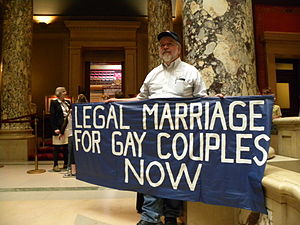DES MOINES–Republican presidential candidates campaigning against gay marriage may win over conservative Iowa caucus-goers Tuesday night, but that strategy won’t work for the majority of Iowan voters or in the general election, say a number of gay-rights advocates.
Iowans, along with voters in other states, are more concerned with improving the economy rather than with social issues such as gay marriage, said Jeff Angelo, a former Iowa Republican state senator and founder of Iowa Republicans for Freedom

, an organization of conservatives that supports marriage rights for gays and lesbians.
“A huge majority of voters, including evangelical voters, are saying that the economy and debt are no. one issues,” Angelo said.
“Moral issues are popping up last on their list.”
Seventy-one percent of Republican Iowan voters said they were concerned with economic issues and 14 percent concerned with social issues, according to an early December New York Times/CBS News poll of 642 likely Republican caucus-goers. Thirteen percent of the voters said they were concerned with both issues equally.
The low numbers posted by Michele Bachmann, Newt Gingrich and Rick Perry in a Des Moines Register poll released over the weekend may be because they’re using an outdated method of campaigning, Angelo said.
“You look at Bachmann and Perry, and they aren’t close to the front-runner status,” Angelo said.
“A lot of (candidates) come here and are advised to run the previous playbook in Iowa and not be forward looking.”
Andy Thayer, a Chicago-based activist who heads the Gay Liberation Network, said not only are more Iowans concerned about the economy, many are in favor of gay marriage now that it’s legal in the state.
“In places that have marriage equality…the majority of people that favorite it increases over time,” Thayer said.
About 58 percent of Republican Iowan caucus goers said they are in favor of some form of same-sex relationship recognition—either marriage or civil unions—according to the December New York Times/CBS News poll. Thirty-eight percent said there should be no legal recognition and 3 percent did not know.
It’s been more than two years since the Iowa Supreme Court ruled in favor of gay marriage. Since April 2009, many Illinois same-sex partners have traveled to Iowa to be married, said Thayer, including Illinois state Rep. Deb Mell (40th) and her partner, who were married in August 2011 in the city of Davenport.
In Illinois, same-sex marriage is illegal, but the state recognizes civil unions. Civil unions don’t receive federal marriage rights. For example, partners in a civil union can file joint state taxes, but have to file separately for their federal taxes.
Randy Hannig, director of public policy for Equality Illinois, which works to defend rights of lesbians, gays, bisexual and transgender, or LGBT, individuals in the state, has a close friend who went to Iowa to be married in 2009.
But, Hannig said, there’s been an “uphill battle” in Illinois for those couples married in Iowa once the civil union bill was signed into law on Jan. 31, 2011.
“Anyone married outside Illinois, (the marriage) automatically became a civil union in Illinois,” he said.
Rachel Caufield, a political science professor at Drake University, said although gay marriage is legal in Iowa, it’s still a “huge issue” among the voters in the western third of the state, which is more socially conservative than compared to the rest of Iowa, she said.
Campaigning on social issues might yield some short-term results in Iowa for candidates, but it has long-term negative effects, said R. Clarke Cooper, executive director of Log Cabin Republicans, a group of Republicans that believes in limited government and rights for gays and lesbians.
A good example is Rick Santorum, Cooper said.
Santorum recently gained some traction in Iowa, but “he doesn’t have the capacity of winning a general election,” Cooper said. Santorum is polling in at about 15 percent – a big jump from earlier polls- according to the Register’s poll of 602 likely caucus-goers conducted by Selzer & Co on Dec. 27 to 30.
Molly Tafoya, communications director for One Iowa, the state’s largest LGBT activist organization, said voters need to select a candidate who not only recognizes all families, but also will address the issues that Americans care most about, like job creation, a growing economy and a good education system—what Cooper refers to as the “bread and butter” issues.
“Unfortunately, we have seen many of the front-runners in this campaign focus more on taking away the rights of loving, committed couples than on bringing our country together,” Tafoya said in an emailed statement.












Be First to Comment